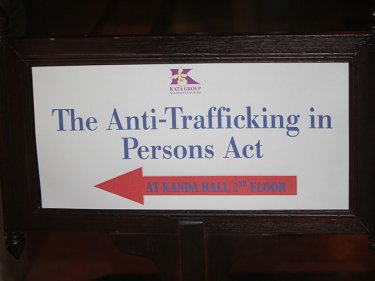PHUKET: In a first for Phuket police, Major General Sorivkrt Kaewpalek, Commander of the Education Branch, Royal Thai Police, today opened a training seminar on anti-trafficking legislation.
The two-day seminar, led by the International Narcotics and Law Enforcement Section, focuses on educating police officers about the Anti-Trafficking in Persons Act.
The training project is supported by the UN Office on Drugs and Crime and is known as the Global E-Learning Project.
''We are very proud of this pilot project,'' Major General Sorivkrt said. ''Human trafficking is not just a problem for Thailand, but is a global problem.''
Thousands of boatpeople from Myanmar (Burma) and Bangladesh have streamed through Thailand in the past few years without detection or with officials turning a blind eye.
In many cases, police defined boatloads of stateless Rohingya as ''Burmese'' because it simplified the process of dealing with them.
The course in human trafficking, together with greater awareness along the Andaman coast of the need to end the trade in people, points to real change at grassroots level.
''This project aims to train 600 police in the southern part of Thailand,'' the general said.
'''Normally this project is set up in Bangkok, but this is the first time the project has come to southern Thailand because of our southern areas are involved in human trafficking.''
After Phuket, the training will be delivered to police in Surat Thani, Songkla and Chumporn provinces.
The UNODC training package aims to help Thai police understand the history of human trafficking and slavery, protocols and methods for dealing with human trafficking and the different types of trafficking, including sexual exploitation and forced labor.
'''We hope this project will increase the knowledge and abilities of police working on the ground,''' Major General Sorivkrt said.
'''We also have two mobile cars to take the equipment and training to the field to educate our police.
''This project is not online yet. We are looking forward to feedback from our officers so we can improve the program and put it online across the world.
'''Our police can then download the program and learn it at home for themselves.
'''In the past we had a lack of knowledge on human trafficking, but we are now very proud that the UNODC and the US Embassy is helping us with this program.
''I believe if you give knowledge and develop the abilities of the people on the ground, we can solve the human trafficking problem in the long term.''
Mr Richard Snelsire, Director of International Narcotics and Law Enforcement with the US Embassy in Bangkok, told Phuketwan, '''We think progress is being made in Thailand in relation to human trafficking.
'''The key to change is a combination of education, training and political will.''
With more boatpeople expected to take to the sea after the national election in Myanmar on November 8, it will not be long before police on the Andaman coast have a chance to put their education to practical use.
The two-day seminar, led by the International Narcotics and Law Enforcement Section, focuses on educating police officers about the Anti-Trafficking in Persons Act.
The training project is supported by the UN Office on Drugs and Crime and is known as the Global E-Learning Project.
''We are very proud of this pilot project,'' Major General Sorivkrt said. ''Human trafficking is not just a problem for Thailand, but is a global problem.''
Thousands of boatpeople from Myanmar (Burma) and Bangladesh have streamed through Thailand in the past few years without detection or with officials turning a blind eye.
In many cases, police defined boatloads of stateless Rohingya as ''Burmese'' because it simplified the process of dealing with them.
The course in human trafficking, together with greater awareness along the Andaman coast of the need to end the trade in people, points to real change at grassroots level.
''This project aims to train 600 police in the southern part of Thailand,'' the general said.
'''Normally this project is set up in Bangkok, but this is the first time the project has come to southern Thailand because of our southern areas are involved in human trafficking.''
After Phuket, the training will be delivered to police in Surat Thani, Songkla and Chumporn provinces.
The UNODC training package aims to help Thai police understand the history of human trafficking and slavery, protocols and methods for dealing with human trafficking and the different types of trafficking, including sexual exploitation and forced labor.
'''We hope this project will increase the knowledge and abilities of police working on the ground,''' Major General Sorivkrt said.
'''We also have two mobile cars to take the equipment and training to the field to educate our police.
''This project is not online yet. We are looking forward to feedback from our officers so we can improve the program and put it online across the world.
'''Our police can then download the program and learn it at home for themselves.
'''In the past we had a lack of knowledge on human trafficking, but we are now very proud that the UNODC and the US Embassy is helping us with this program.
''I believe if you give knowledge and develop the abilities of the people on the ground, we can solve the human trafficking problem in the long term.''
Mr Richard Snelsire, Director of International Narcotics and Law Enforcement with the US Embassy in Bangkok, told Phuketwan, '''We think progress is being made in Thailand in relation to human trafficking.
'''The key to change is a combination of education, training and political will.''
With more boatpeople expected to take to the sea after the national election in Myanmar on November 8, it will not be long before police on the Andaman coast have a chance to put their education to practical use.









